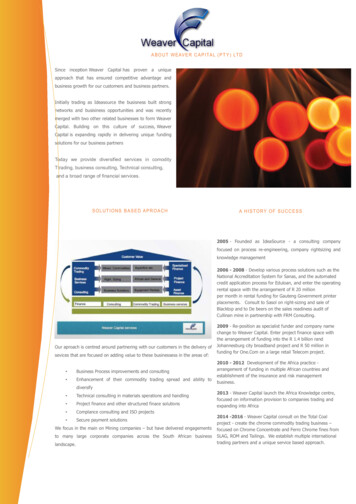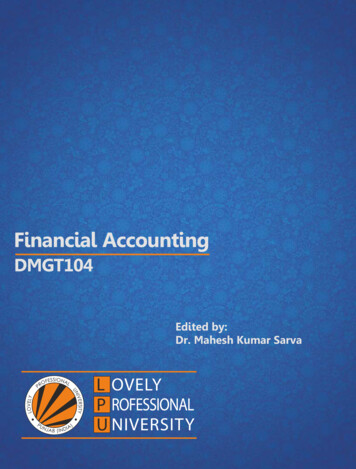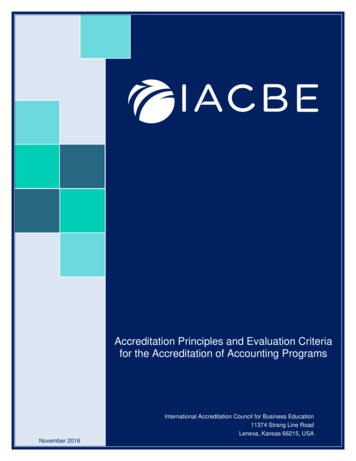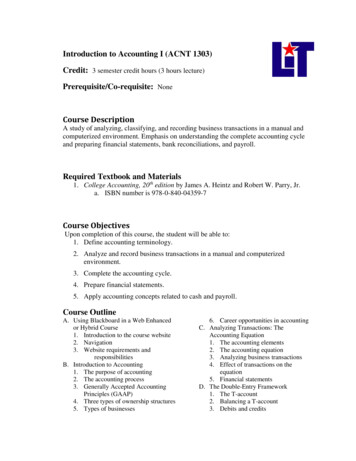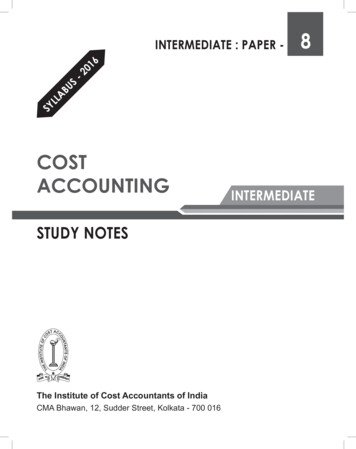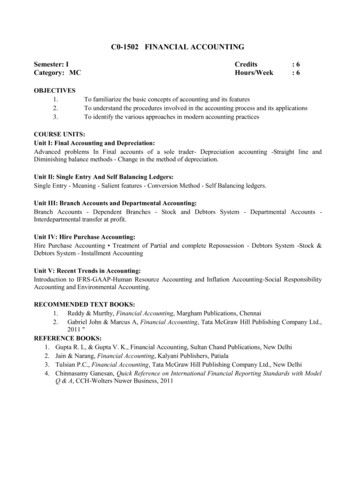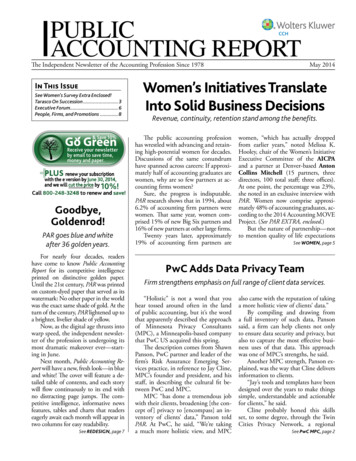
Transcription
PUBLICACCOUNTING REPORTThe Independent Newsletter of the Accounting Profession Since 1978In This IssueSee Women’s Survey Extra Enclosed!Tarasco On Succession.3Executive Forum.6People, Firms, and Promotions.8& Save 10% PLUSReceive your newsletterby email to save time,money and paper.renew your subscriptionwith the e version by June 30, 2014,and we will cut the price by 10%!Call 800-248-3248 to renew and save!Goodbye,Goldenrod!PAR goes blue and whiteafter 36 golden years.For nearly four decades, readershave come to know Public AccountingReport for its competitive intelligenceprinted on distinctive golden paper.Until the 21st century, PAR was printedon custom-dyed paper that served as itswatermark: No other paper in the worldwas the exact same shade of gold. At theturn of the century, PAR lightened up toa brighter, livelier shade of yellow.Now, as the digital age thrusts intowarp speed, the independent newsletter of the profession is undergoing itsmost dramatic makeover ever—starting in June.Next month, Public Accounting Report will have a new, fresh look—in blueand white! The cover will feature a detailed table of contents, and each storywill flow continuously to its end withno distracting page jumps. The competitive intelligence, informative newsfeatures, tables and charts that readerseagerly await each month will appear intwo columns for easy readability.See REDESIGN, page 7May 2014Women’s Initiatives TranslateInto Solid Business DecisionsRevenue, continuity, retention stand among the benefits.The public accounting professionhas wrestled with advancing and retaining high-potential women for decades.Discussions of the same conundrumhave spanned across careers: If approximately half of accounting graduates arewomen, why are so few partners at accounting firms women?Sure, the progress is indisputable.PAR research shows that in 1994, about6.2% of accounting firm partners werewomen. That same year, women comprised 15% of new Big Six partners and16% of new partners at other large firms.Twenty years later, approximately19% of accounting firm partners arewomen, “which has actually droppedfrom earlier years,” noted Melissa K.Hooley, chair of the Women’s InitiativeExecutive Committee of the AICPAand a partner at Denver-based AntonCollins Mitchell (15 partners, threedirectors, 100 total staff; three offices).At one point, the percentage was 23%,she noted in an exclusive interview withPAR. Women now comprise approximately 48% of accounting graduates, according to the 2014 Accounting MOVEProject. (See PAR EXTRA, enclosed.)But the nature of partnership—notto mention quality of life expectationsSee WOMEN, page 5PwC Adds Data Privacy TeamFirm strengthens emphasis on full range of client data services.“Holistic” is not a word that youhear tossed around often in the landof public accounting, but it’s the wordthat apparently described the approachof Minnesota Privacy Consultants(MPC), a Minneapolis-based companythat PwC US acquired this spring.The description comes from ShawnPanson, PwC partner and leader of thefirm’s Risk Assurance Emerging Services practice, in reference to Jay Cline,MPC’s founder and president, and hisstaff, in describing the cultural fit between PwC and MPC.MPC “has done a tremendous jobwith their clients, broadening [the concept of ] privacy to [encompass] an inventory of clients’ data,” Panson toldPAR. At PwC, he said, “We’re takinga much more holistic view, and MPCalso came with the reputation of takinga more holistic view of clients’ data.”By compiling and drawing froma full inventory of such data, Pansonsaid, a firm can help clients not onlyto ensure data security and privacy, butalso to capture the most effective business uses of that data. This approachwas one of MPC’s strengths, he said.Another MPC strength, Panson explained, was the way that Cline deliversinformation to clients.“Jay’s tools and templates have beendesigned over the years to make thingssimple, understandable and actionablefor clients,” he said.Cline probably honed this skillsset, to some degree, through the TwinCities Privacy Network, a regionalSee PwC MPC, page 2
PUBLICACCOUNTING REPORTVolume XXXVIII, No. 5Editor: Julie LindyEmail: Julie.Lindy@wolterskluwer.comSenior Contributing Editor:Bryan PowellContributing Editors: Sandra Lim,Tony PowellProduction Editor: Craig ArritolaManaging Editor: Terry VaughanCoordinating Editor: Jim WalschlagerPUBLIC ACCOUNTING REPORT(ISSN 0161-309X) is publishedmonthly by CCH, a part of Wolters Kluwer, 4025 W. Peterson Ave.,Chicago, Illinois 60646. Subscriptioninquiries should be directed to 4025W. Peterson Ave., Chicago, IL 60646.Phone: (800) 449-8114.Fax: (773) 866-3895.Email: cust serv@cch.com. 2014 CCH Incorporated.All Rights Reserved.Permissions requests: Requests forpermission to reproduce contentshould be directed to CCH,permissions@cch. com.Photocopying or reproducing in anyform in whole or in part is a violationof federal copyright law and is strictlyforbidden without the publisher’sconsent. No claim is made to originalgovernmental works; however, withinthis product or publication, the following are subject to CCH’s copyright:(1) the gathering, compilation, andarrangement of such governmentmaterials; (2) the magnetic translationand digital conversion of data, if applicable; (3) the historical, statutory, andother notes and references; and (4)the commentary and other materials.2PwC MPC, continued from page 1network of privacy professionals created by Cline, which includes privacyconsultants and practitioners fromcompanies of various sizes. The acquisition also includes the methodologiesand benchmarking tools of the network, according to PwC.“It’s a way to get together, toshare knowledge. It’s a thought leadergroup, getting all of the thought leaderstogether to share privacy concerns andissues,” Panson said.PwC became acquainted withCline through his involvement inthe International Association of Privacy Professionals (IAPP), an industrygroup, and by word-of-mouth fromPwC clients.As part of the acquisition, Clinejoined PwC as a principal and becamea leader in the firm’s Data Protectionand Privacy Practice. The entire MPCteam also joined PwC. The Big Fourfirm coyly declined to specify the exact number of MPC staff members. Itis fewer than 10 individuals, but notmuch fewer than 10, Panson said.Cline formed MPC in 2006. Thecompany specialized in privacy compliance, particularly in healthcare (including the medical device and pharmaceutical sectors), cloud computing andEuropean privacy protection compliance. The company worked with multinational corporations, governmentagencies, universities and nonprofits.Healthcare, Panson acknowledged,was “certainly a strength of MPC.”He added that the combination was agreat fit that enables PwC to service itsexisting healthcare clients with MPC’sskills set.Cline and his staff will remain inMinneapolis.“That’s where Jay lives and built hispractice. There are a number of largeclients there in the healthcare space,as well as in the electronics/technology space,” Panson said, but he notedthat Cline will play “a national role” inthe firm’s Data Protection and PrivacyPractice, working in many of the firm’skey markets.“We’re a few weeks in [with the addition of MPC] here, and Jay and histeam are already fully integrated withour existing Data Privacy and Protection practice,” Panson said. “Our existing practice does work related tothe Federal Trade Commission andorders the FTC has issued to clients.Jay and his team are helping in utilizing our resources in the expansion ofour services.”Cline and his staff also have alreadyhad an impact in working with privacyaspects of third-party vendor relationships, Panson said.The addition of Cline and MPChas an international benefit for PwC aswell, Panson explained.“Privacy laws continue to expandand grow we see expansion of lawsnot only in the U.S. but in the E.U., aswell. Singapore just put out new privacylaws. All over the globe, new privacy lawsand regulations are constantly being released, which require action from ourclients, and certainly they’re looking forour help and guidance. It’s a tremendouschallenge for our clients and a tremendous opportunity for us,” Panson said.“One other tool that Jay came withwas an inventory of what those globalprivacy laws and regulations are. That’sSee PwC MPC, page 3CCH Learning CenterThe goal of CCH, a part of Wolters Kluwer, is to provide you with theclearest, most concise and up-to-date information to help further yourprofessional development. Our goal also is to provide you with a convenient method to satisfy your continuing education requirements. The CCHLearning Center offers a complete line of self-study courses covering complex and constantly evolving accounting and auditing issues. We are continually adding new courses to the library to help you stay current on allthe latest developments. The CCH Learning Center courses are available24 hours a day, seven days a week. You’ll get immediate exam results andcertification. To view our complete accounting and auditing course catalog,go to http://cch.learningcenter.com.Public Accounting Report May 2014
Guest ColumnIntegrated ServicesEvolve As Key ToSustaining FirmsBy Joe TarascoAccountants Advisory GroupCold Spring, N.Y.(Editor’s Note: This is the final installment ofa three-part series. See the March and April issuesof PAR for the previous installments.)Shawn PansonJay ClinePwC MPC, continued from page 2viding a key benefit toward a comprehensive privacy package for clients. It’snot just a compliance issue, he said, but abusiness imperative that organizations beprepared for a security or privacy breach.“It seems like every company isgoing to deal with some type of cyber security concern, if they haven’talready, so we’re working with ourclients to help them develop . anincident response plan that’s allencompassing,” he said. “We’re tryingto cover all those aspects to make sureour clients are covered upfront withthe right controls in place, the rightunderstanding of where their data is,and—on the back end—[to have] aplan in place today should there bea security breach or a privacy breach,to be able to handle that rather thanwaiting and reacting after somethinggoes wrong.” obviously a tool that a lot of our clientsare looking for to help them, [in order]to get an inventory of what the privacyregulations are before they can even getstarted with compliance.”One such law, the Foreign Account Tax Compliance Act (FATCA),passed into law in the U.S. in 2010,requires foreign financial institutions(FFIs) to report to the IRS information about financial accounts held byU.S. taxpayers, or by foreign entitiesin which U.S. taxpayers hold a substantial ownership interest.“There’s a great deal of concernover the privacy of client informationthat’s being transmitted” as a result ofFATCA, Panson said.In the long term, Panson sees the addition of Cline and his MPC team pro-In March, this column noted thatmore than 90% of U.S. accountingfirms have revenues under 10 million, and many of them are strugglingto grow their top and bottom linesorganically.Slow organic growth in the accounting profession is due to an exceedinglycompetitive and price-sensitive marketplace, combined with lack of innovation in the types of services offered bypublic accounting firms.An overwhelming number of U.S.accounting firms have been providingthe same types of services for years, andsubsequently, their growth has been achallenge for the last five years, evenafter making significant investments inmarketing and public relations. Firmscontinue to encounter significant competition in traditional commoditydriven services, but relatively few are attacking the marketplace with new andinnovative services, where there is lesscompetition. As competition for traditional compliance services increases,See TARASCO, page 4Did youyou knowCCH?DidknowyouyoucancanfollowfollowCCH?You can find us ter.com/CCH Whats Newtwitter.com/CCH Whats tube.com/cchwolterskluwerPublic Accounting Report May 20143
Tarasco, continued from page 3they are quickly commoditizing, andfee sensitivity is intensifying as firmscompete on price instead of value.A change in marketing strategyis required to meet the needs and desires of the marketplace and to gain acompetitive edge over larger firms withmore resources. What better way to differentiate a firm in its marketplace thanto be at the leading edge of a new andappealing service? Firms must maintaina contemporary marketing strategy toadapt to the changing marketplace byusing an integrated services approach toachieve future organic growth.Firms that provide integrated services focus on discerning clients’ actual needs beyond compliance. Theydetermine how to meet those needsand deliver commensurate service tothe marketplace on an accelerated timeframe. Delivering quality compliancetype services is no longer enough to beconsidered a firm that provides qualityservice. Clients and the marketplaceare demanding much more. They wanttheir accounting firm to be an “integrated solutions services provider.”One of the most significant challenges firms face amongst these issues isfinding the proper balance of managingthe firm as a practice versus a business.The marketplace now clearly dictatesthat the scales are tipped in favor of thebusiness strategy.New York-based Marcum LLP is aperfect example of a firm moving intoan untapped marketplace in an integrated service approach as the same-sexmarriage tax compliance and advisoryservices market place expands. Currently, 25 states allow same-sex couples tofile a joint state return, and the numberis growing. (See related item, p. 7; January 2014 and September 2012.)Likewise, trendsetters like DixonHughes Goodman, based in Charlotte, N.C., are solidifying their coreservices base by acquiring complementary consulting and advisory firms.For example, DHG recently acquiredCrossfire Advisory to complement andexpand its existing healthcare practice.Deloitte is shaping its future as anintegrated corporate solutions providerby acquiring a business strategy consulting firm, an investment bank, an SAP4consulting firm, a construction consulting group and a social media agencyall in one year. That’s warp speed.These are examples of firms thatare moving rapidly into an integratedsolutions approach to service offerings. They evaluated the marketplaceand decided which capabilities can beprovided in house, which ones are nolonger required or profitable and areacquiring the necessary know-howto fill their strategic gaps. Firms musttransform and restructure their organizations to have the capabilities to tailortheir services to solve clients’ problems.Relying on compliance services for organic growth simply isn’t a strategy thatJoe Tarascowill take a firm to its next level of success. Firms that don’t adapt to the newreality will sink further into the commodity pit and be buried in volumes oflow-profit work.Many firms have developed a platform of contemporary services and havemade significant investments in promoting them by upgrading websites,creating professionally written and designed newsletters, hiring professionalmarketing directors and consultants,designing innovative promotional collateral materials, and other activities;but often, they haven’t seen these effortsgenerate anticipated return on theirmarketing investments. In such cases,the partners often question whether theinvestment was worth it.Quite often, the problem is notthe failure of the marketing programor in-house marketing professionals,but rather a failure to delineate whenmarketing ends and where sales begins.Selling is a contact sport that takes numerous communications and toucheswith prospects. Marketing supportsselling. It doesn’t close the sale. Mostfirms in succession crisis need partnerswho have the contacts to generate newbusiness. They usually don’t have theluxury of developing rainmakers within the time frame necessary to replacerainmaking founders. These firms arebetter served by hiring a professionalin-house salesperson.Sales professionals can significantlyincrease the rate of new business opportunities for the firm by identifying andinitiating contact with prospective clientsand potential referral sources at a muchfaster pace than client service partners.In addition, sales professionals canprovide support to partners on new client leads and proposals. Hiring a professional salesperson will significantlyreduce the amount of time client service partners spend on lead generation.It will also reduce the time gap for results between marketing and sales.Whereas marketing success dependson a firm’s ability to implement a seriesof well-organized promotional effortsand tools, successful selling depends onthe skills of individuals who have thetime and experience to develop qualifiedprospects quickly and introduce them toclient service partners, who can developrelationships with prospects and subsequently turn them into new clients.In today’s competitive business climate for quality clients and staff, no firmcan afford a status quo culture and expectsuccession to be successful. Instilling andsustaining a sense of urgency to take thenecessary actions to accelerate a successful succession plan is the only choice forremaining an independent firm. Would you like to write a guest column for Public Accounting Report? PAR islooking for guest columns written by firmleaders and experts who wish to share theirideas and stories about leadership, profitability, firm growth, talent management,quality client service, challenges in the profession, and other strategic topics. For further information, email Editor Julie Lindyat julie.lindy@wolterskluwer.com with thesubject line: Guest Column Inquiry.Public Accounting Report May 2014
Women, continued from page 1for both genders—has changed overthe last two decades as well. So has thenature of competition and accountingfirm continuation.The 2014 MOVE Project data onwomen’s advancement in the professiondovetails with notable trends across theprofession and elsewhere, including asuccession crisis that spurs consolidation of accounting firms, increaseddemand by both genders for work/lifebalance, increased competition andglobalization within and outside the accounting profession, and a competitiveimperative to expand specialized highvalue services and to mine underservedmarkets to fuel organic growth.Investing the resources to retain talented women “seems like a no brainerfrom a business perspective, besides being the right thing to do,” said ToddGoldman, a member of the executivecommittee and board of directors atRothstein Kass (FY13 net revenue: 202 million; 80 principals, 1,000 totalstaff, 10 offices). “If you’re not keepingyour share of talent, you’ll have a toughtime staying competitive.” Goldman isbased in the Walnut Creek, Calif., office of RK, which is headquartered inRoseland, N.J.RK began its Rainmakers Roundtable several years ago to help nurture high-potential women managersand senior managers to partnershipthrough unique mentoring opportunities. When possible, women are mentored by male partners outside the offices or business lines where they workto minimize fear and enhance interoffice connections.The result? A significant bump inrevenue and a growing pool of partnership candidates: In 2014, RK saw 6.5million in direct revenue from its Rainmakers Roundtable.“I believe the number is closer to 10million in indirect revenue,” Goldmantold PAR. “In some cases, these womenmay not have received credit for revenue even though they contributed to it.Also, ROI includes retention, and that’san enormous savings. Lots of studiesshow the cost of turnover is as muchas 2.5 times annual salary per person,”and RK leaders believe the Rainmakers Roundtable played a significant rolePublic Accounting Report May 2014Melissa HooleyTodd Goldmanin boosting the firm’s retention rate to43% in key areas.Four Rainmaker Roundtable women now are principals, and several morewill be principals in the next year ortwo, he added. “A big part was buildingthe pipeline. We planted the seeds, andnow the harvest is starting to come in.”Intangible benefits to RK fromits Rainmakers Roundtable are evident but impossible to document,Goldman added.“There are lots of intangible benefits beyond pure revenue and retention,” he said. “We’ve become knownas a women’s leader. It’s helped usland clients. It helps us manage better. I think everybody knows that themore diverse your management groupand decision makers are, the betterthe organization’s decisions will be,theoretically. But living through itand seeing it in action, I’ve witnessedthat it really does happen. Everybodyis better off.”Sustainability of the profession isalso at stake, Hooley added.“We have an amazing number ofprofessionals in the accounting profession retiring. If we don’t retain thetalent we have—both men and women—we have real issues,” she said. “Tokeep the profession viable, we have tofill the pipeline, and where we’re losingtalent is with the women. Firms haveto be competitive and sustainable in themarketplace, and the firms that monitor advancement of women well are thefirms that are successful.”Strategic women’s initiatives arecrucial to the long-term success of accounting firms, she added.“If you look at statistics and demographics, women are advancing. Thelast piece is at the partner level. I thinkit’s a cultural issue and an individual issue: There are two pieces to the puzzle.Women have to believe they can makeit to the top levels and have visible rolemodels, and they have to receive thementoring and advocating throughtheir careers to get to certain levels andrealize certain key skills they need todevelop,” Hooley said.Research demonstrates that womentend to believe they need 100% of allskills to do the job at the next level,while men are confident they will learnthose skills in the job, she added.Programs like RK’s RainmakersRoundtable help reframe that perspective for women, which is why RK prefersto pair male partners with rising women.“One of our tipping points waswhen we went to our mentorship program,” Goldman said. “We reachedout to leaders, including me, and askedthem to mentor women we’d identified as potential future leaders—typically managers and senior managers—to help them get an awareness of lifemuch deeper in the organization. Andin the process, a lot of male leaders gotto see not only the challenges womenface, but also what they can contribute.The women, by having access to maleleaders, learned about opportunities inSee WOMEN, page 75
Executive ForumChange Is Inevitable; Growth Is Optional:Adaptability Becomes A Competitive ImperativeFirm leaders discuss significant changes their firms have made.In this competitive environment,firms must be readily adaptable tochange. This nimbleness means strategizing and planning on an ongoingbasis to ensure growth. This month,PAR asks firm leaders, “What is a significant change that your firm has madein the last three years that has paid offin terms of growth and profitability?What motivated the change and howwas it implemented?”Charly Weinstein, CEO, EisnerAmper/New York(FY13 net revenue: 276.9 million; 177 partners,976 total staff,nine offices):Tr a d i t i o n ally, our firm hasgrownorganically. However,in the recent economic environment,meaningful organic growth has become a challenge. About three yearsago, we developed a growth strategythat embraced mergers and acquisitions. A priority for the firm that wasintegral to our M&A plan was to create national practices built on threeof our most successful groups withwell-established track records and thepotential for rapid growth: financialservices, technology and real estate.The strategy is paying off: Our recentcombination with San Franciscobased Harb, Levy & Weiland had theimmediate result of creating nationalpractices for our financial services andreal estate groups. The transactionalso created a West Coast base for ourtechnology practice. Another directconsequence of our M&A activity wasan influx of extraordinary new talentbroadening our client service offeringsin these key growth areas. The resultsto date have exceeded our expectations, so our philosophy is to remainopen to M&A opportunities as theypresent themselves.6Tommy Lawler, managing partnerand CEO, Weaver/Fort Worth, Texas(FY13 net revenue: 83 million;42 partners, 480total staff, nine offices):Competitionfor Texas accounting firms continues to increase as out-of-state firmsenter our market. Dallas/Fort Worthand Houston are resilient markets, making Texas very attractive for regionaland national competitors seeking Texas’growing business climate advantage tocourt Texas firms. In the last three years,Weaver made a significant change thatprovided firm growth and profitability:an emphasis on industry expertise andtalent acquisition. This gives us a competitive advantage. We implemented thisstrategy, communicated it to our teamand reinforced our focus so that it became engrained in our culture. We holdourselves accountable by sharing the planwith the firm, how we plan to accomplish it and reporting the plan’s ongoingstatus. We identified industry groupsthat lead our growth and emphasize ourexpertise, knowledge and experience.Our industry-related revenue increasedby more than 40%. We focus our industry expertise in every aspect: from hiringto training to business development.Mark Bosswick, co-managing partner, Berdon LLP/New York (FY13net revenue: 101million; 39 partners, 398 totalstaff, two offices):Berdon successfully accomplished the transfer of leadershipof the firm as of January 1, 2012, ina seamless fashion, thanks to years ofplanning. When Stanley Freundlich,managing partner for 30 years, begancontemplating retirement, a successionplan was put into place that included[five key points]: (1) early identification of successors (Editor’s note: Bosswick and Stuart Kotler were namedco-managing partners); (2) expansionof the executive committee from four[members] to eight members; (3) transfer of client responsibility from Freundlich to other partners; (4) continueddevelopment of the firm’s next generation, including support for highereducation (J.D.s, LL.M.s and othercertifications)—a large percentage ofBerdon’s partners, including the managing partners, hold both the CPA designations and J.D. degrees; and (5) development of a “think-tank” approachto client service, which exposes clientsto multiple partners and service specialties. The past two years under [our]leadership have seen consistent growth,continued staff development, betterinternal operations with several keyadministration hires and further development of select niches. The firm continues to seek out appropriate M&Acandidates or lateral partner hires.Joe Adams, managing partner andCEO, McGladreyLLP/Chicago(FY13 net revenue: 1.4 billion; 617partners, 6,723 total staff, 75 U.S.offices):The most significant change atMcGladrey during the last three years was the buy-backof the RSM McGladrey tax and consulting business in November 2011. Thiswas a necessary step to re-energize ourpartners and put McGladrey on a pathto achieve our future objectives. As areunified firm, we have set forth a newvision to be the first-choice advisor tomiddle-market leaders and created anSee EXECUTIVE FORUM, page 7Public Accounting Report May 2014
Executive Forum, continued from page 6aggressive strategy to bring the visionto life. We have spent significant timeengaging our people, and there is a renewed focus and energy within our firm.We have made significant progress onkey change missions that are essential toour firm’s future, and we have investedin both our talent and client experience.We also continue to invest in growth areas, such as private equity and technology consulting—particularly, cloud anddata privacy services. This has drivenstrong growth and profitability.Jeffrey Weiner, managing partner,Marcum LLP/New York (FY13net revenue: 350million; 160 partners, 1,300 total staff, and 23offices):At Marcum,change is a constant in that wecontinually work to diversify our service offerings and deepen our talentpool while expanding our firm’s accessibility to clients in new regional marWomen, continued from page 5our firm that they weren’t aware of. Justtalking to another person who takes aninterest in your career and notes gapsin experience helps launch you in theright direction.”Hooley noted that one differentiatorthat makes women’s initiatives especially successful is they’re a joint collaborative effort by leaders who are both menand women.“We tend to put advancement ofwomen on the shoulders of womenleaders to bring up all these womenbehind them,” she pointed out. “Thatwon’t work. There has to be a completecultural shift at firms where men andwomen work together as leaders tomake this happen. Think about it: The19% of women who are partners can’tbring up the 50% of accounting professionals who are women.”Once men understand the businesscase—the money left on the table andthe threat to firm continuity—they’rePublic Accounting Report May 2014kets. In 2012, Marcum became the firstnational accounting firm to establisha full-service practice dedicated to theunique, and often complex, tax andestate planning needs of the lesbian,gay, bisexual and transgender (LGBT)community. (See related article, p. 3.)This new practice has quickly growninto a profit center for the firm thatwill continue to flourish as more statesmove to legalize same-sex marriage.The past three years have also been aperiod of marked expansion for Marcum geographically, through both organic growth
e Independent Newsletter of the Accounting Profession Since 1978 May 2014 PUBLIC ACCOUNTING REPORT PLUS renew your subscription with the e version by June 30, 2014, and we will cut the price by 10%! Call 800-248-3248 to renew and save! Receive your newsletter by email to save time, money and paper. & Save 10% In This Issue



